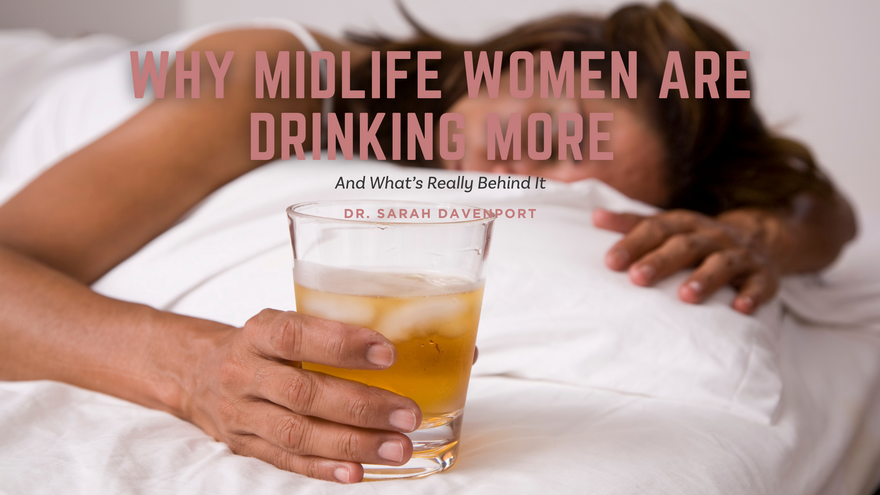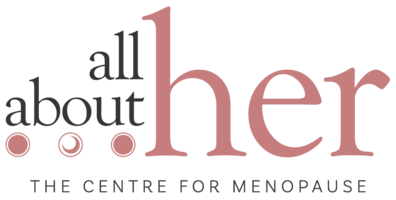
Why Midlife Women Are Drinking More - And What’s Really Behind It
Dr Sarah Davenport, Clinical Psychologist
When Drinking Shifts From Treat to Routine
For many women, alcohol can start to take on a more central role in midlife. There’s the laughter and release of sharing wine over dinner with friends. A way to blow off steam, celebrate the end of a hard week, loosen the reins of responsibility, and simply have fun. And then there’s the quiet glass at home after everyone’s gone to bed. The one that helps you switch off, feel calm, or momentarily escape the constant mental load.
Both can start as small comforts or well-earned rewards. But for some women, those moments can slowly shift from being a pleasure to a pattern - one that feels harder to step away from. If you’ve ever found yourself wondering whether alcohol is taking up more space in your life than you’d like, you’re not alone.
Rising Rates of Alcohol Use in Midlife Women
Across Australia, more women in their 40s, 50s, and 60s are drinking at risky levels than ever before. According to the Australian Drinking Guidelines, risky alcohol consumption can be defined by two key measures:
- Long-term risky drinking: whether or not a respondent consumed an average of more than two standard drinks per day in the last year.
- Risky-single occasion drinking: whether or not a respondent consumed five or more standard drinks on any occasion at least 12 times in the last year.
Research from the National Drug Strategy Household Survey (NDSHS) shows that the prevalence of long-term risky drinking in mid-life women rose from 8.8% in 2001 to 11.7% in 2019, and the rate of risky single occasion drinking (RSOD) increased from 13.5% to 21.2% over the same period. The proportion of women abstaining remained the same across the same time period (around 21%).
So what’s behind this trend?
Understanding the Factors Behind Midlife Women’s Drinking
Midlife is full of change - in our bodies, relationships, careers, and sense of identity. Many women are managing demanding jobs, supporting ageing parents, launching children into adulthood, and navigating menopause, often all at once.
For some, alcohol becomes a small comfort in the middle of all that change. Common reasons women report drinking more during this stage include:
Stress and Emotional Overload
Alcohol can feel like an easy way to take the edge off after a long day. Research shows that people who engage in risky drinking are more likely to experience anxiety and depression - both of which are rising among midlife women. Women are also more likely than men to use alcohol to manage stress and regulate difficult emotions.
Changing Social Norms
Drinking has become more normalised and socially acceptable among women. Increased financial and social freedoms due to increased participation in the workforce and evolving gender roles mean more opportunities for women to drink alcohol and less stigma attached to doing so.
Social Connection and Identity
Sharing drinks with friends can symbolise freedom and belonging - a chance to reconnect with who you are outside of duty and responsibility. Online “wine culture” messaging can make drinking feel like a natural part of self-care. It’s no surprise then that marketing often links alcohol to women’s desires for connection, pleasure and autonomy.
Work and Caregiving Pressures
Midlife women often juggle multiple roles and responsibilities. Alcohol can seem like a quick way to unwind, regain a sense of control, or claim a moment of freedom amid constant demands.
Isolation and Loneliness
Women living in rural or remote areas or those who are separated or single have a significantly greater likelihood of risky drinking. This may be because they have limited access to spaces and activities that provide opportunities to socialise, and many of those that do centre on alcohol. Drinking may also dampen feelings of loneliness or serve as a substitute for connection.
Home-Based Drinking Habits
Undoubtedly, the COVID-19 pandemic blurred the boundaries between work and home life. Research shows that people working from home more than 15 hours per week were significantly more likely to consume alcohol. Online alcohol sales and home delivery has made alcohol more accessible than ever, facilitating longer and heavier drinking sessions.
Menopause and Alcohol
Many women say they use alcohol to manage the physical and emotional symptoms of perimenopause and menopause. Whether it’s difficulty relaxing, switching off their anxious thoughts, or getting to sleep, alcohol’s immediate sedative effect provides some short-term relief. Sadly, this is often replaced by worse vasomotor symptoms, mood, disrupted sleep, weight gain, and cognitive fog in the medium- to long-term.
Breaking the Cycle of Stress and Alcohol Use
These factors create a perfect storm where drinking feels both normal and deserved. Yet it can also deepen stress, anxiety, and fatigue, and erode your confidence and well-being. Many women find themselves in a frustrating cycle where alcohol promises relief but leaves them feeling worse.
If you’ve been feeling uneasy about your drinking, it can help to pause and gently check in with yourself. Try reflecting on questions like:
- When and why do I reach for a drink?
- How do I feel the next day — physically and emotionally?
- Have I noticed needing more to feel the same effect?
- What would it feel like to take a short break or reduce my intake?
There’s no need to label yourself or make sweeping decisions. Small, curious steps are often the best place to start. Some women find it helpful to track their drinking, plan alcohol-free days, or explore other ways to unwind, connect, and have fun.
Addressing Alcohol Use in Midlife
If you’re worried about your relationship with alcohol, it doesn’t mean you’ve failed or lost control. It means you’re human, and you’re paying attention. The truth is, alcohol use in midlife isn’t about weakness or willpower. It’s about stress, coping, culture, hormones, and the deep human need for relief, agency, and connection.
Reach out to explore your next steps. With the right support, you can uncover what’s driving your drinking, find healthier ways to manage stress, and create a more balanced, fulfilling midlife.
Visit Dr. Sarah Davenport’s Website
📸 Follow on Instagram
📅 Book an Appointment

Comments